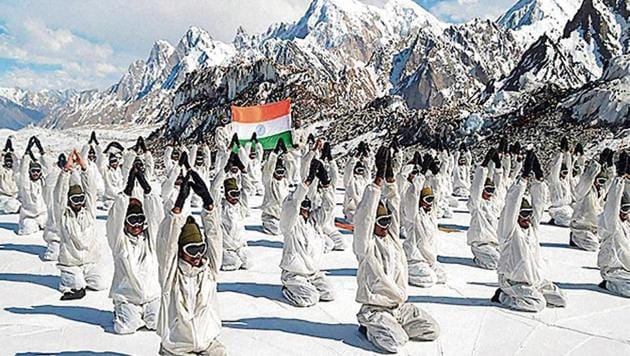Soldiers in Siachen won’t have to wait 90 days for a bath anymore
The soldiers are likely to be supplied with indigenously-developed waterless body hygiene products. Kolkata-based Eastern Command, which is responsible for guarding India’s disputed border with China, has tested and ordered the products, two officials said on condition of anonymity on Monday.
Soldiers deployed on the Siachen glacier may soon be able to bathe, a luxury they cannot currently afford during their three-month stay at posts located at heights of up to 21,700 feet as water is a scarce resource.

The soldiers are likely to be supplied with indigenously-developed waterless body hygiene products. Kolkata-based Eastern Command, which is responsible for guarding India’s disputed border with China, has tested and ordered the products, two officials said on condition of anonymity on Monday.
India deploys around 3,000 soldiers at any given time on the glacier, where temperatures can drop to minus 60 degrees. Guarding the strategic glacier costs ₹five crore to seven crore daily.
“Soldiers deployed along the Line of Actual Control with China in the Northeast have found waterless bath products very useful. Based on that feedback, the Eastern Command has ordered thousands of bottles of these products. Troops in other high-altitude areas including Siachen will also get these products,” said one of the officials quoted above.
Almost 80% posts on the glacier are located above 16,000 feet, with Bana towering above the rest at 21,753 feet. Soldiers have to trek for almost 28 days covering a stretch of 128 km to reach some of the farthest pickets on the glacier, one of the most desolate places on this planet.
“Every soldier deployed on the glacier goes without a bath for 90 days. That won’t be the case anymore. The waterless body hygiene products will allow them to bathe at least twice a week. About 20 ml gel is good enough for a full body wash,” said the second official.
The Army Design Bureau (ADB), which was inaugurated in August 2016 to promote research and development and act as a bridge between the force and the private sector to meet the army’s requirements, has facilitated the availability of waterless body wash. New Delhi’s Indian Institute of Technology has developed the hygiene products.
“It is a great move from the point of view of personal hygiene. Melting ice into the water on Siachen would require a lot of fuel and is not feasible,” said an officer, who has served on the glacier.
The ADB has identified 130 problems facing the army in three separate reports. It seeks to find indigenous solutions to them. These problems include a drop in engine performance of tanks and infantry combat vehicles at high altitude, difficulties in laying bridges for movement of troops and vehicles in mountains, smart vests for soldiers with built-in codes for identification, sniper scopes to engage targets with greater precision and robots to carry equipment in the high-altitude area.
Solutions to 25 problems are being implemented while the other areas are still a work in progress, said an ADB official.






